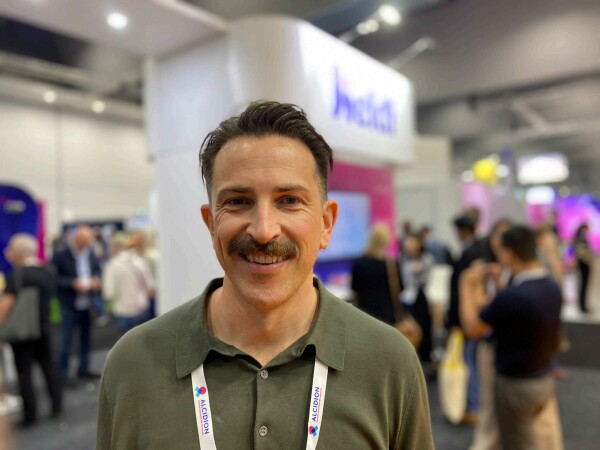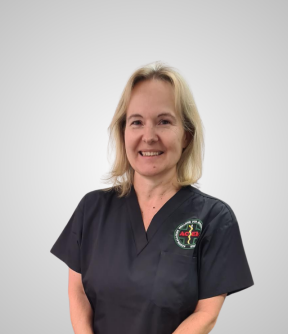Rural psychiatry and psychology save hours with Heidi

Heidi Health GTM clinical specialist Dr Ben Condon pictured at DHF25. Photo: Reesh Lyon
Heidi Health GTM
Challenges facing Australia's rural psychiatry and psychology workforce could be addressed by the greater uptake of medical scribes, according to a leading emergency physician.
My Emergency Doctor (MED) medical director Dr Tatiana Lowe told Pulse+IT that psychiatrists spent "a lot of time" writing notes after a consult "and as you can imagine, the subject matter is quite complex - there's a lot to get through if they are to provide a really good summary and course of action for the local GP."
Dr Lowe said that's where MED's chosen medical scribe Heidi Health had proven invaluable.
"We're talking hours of time and having Heidi Health, the Al transcription service, certainly made that a lot quicker for them, especially given that you can adapt it to suit a specialty."
Dr Lowe said a psychiatrist could outline the standard format used and key components typically included in letters, and based on this, Heidi could then create a customised template aligned with the psychiatrist's preferred style and content structure.
"It makes it a lot quicker for a psychiatrist -meaning we can get through more patients."
Dr Lowe said with Heidi, MED's psychiatrists saved more time than GPs on average, because their consults were much longer.
"And the actual amount of detail they're required to provide to the treating practitioner to really then enact all their suggestions and maintain that longer term relationship is much more detailed. So the time saved with Heidi is even more significant."
She suggested that per consult, time saved could be anywhere between 15 to 45 minutes, depending on the complexity of the consult.
"The longer, the more complex the consult, the more time you save on the admin."
TIME SAVED
Dr Lowe compared this to an average short emergency consult, where a clinician could save between three to four minutes.
"But that adds up over every day. We're doing 4000 consults a month in our business."
"Saving those small bits of time in emergency, much larger bits of time in mental health has helped us be able to service more clients in rural and regional Australia."
Heidi Health GTM clinical specialist Dr Ben Condon said Heidi could also provide a level of detail that a time-pressed clinician could struggle to include.
"If you've got an emergency note from an emergency physician - and you've got an updated plan and outcomes - the communication back to the GP or back to the geriatrician or even the pharmacist about updating medications is way above what a clinician could reasonably produce - they just don't have the time to go into the level of detail that Heidi can go into."
Dr Condon said time savings also translated to cost-savings and improved staff wellbeing.
"Practice managers understand, looking at their junior staff and the overtime bill, that they could probably easily half that just by using a scribe and getting people home on time."
RURAL ACCESS
The Royal Australian and New Zealand College of Psychiatrists has pointed to statistics showing that only 14 per cent of Australian psychiatrists serve rural and remote areas, despite those regions comprising 29 per cent of the population - approximately 7 million people.
RANZCP cited AIHW data showing there were as few as zero psychiatrists serving many remote parts of Australia, a statistic it said was causing a "big gap" in mental health services for rural communities.
Dr Lowe welcomed innovations such as medical scribes that could ease the burden on Australia's rural medical workforce.
"The mental health waiting times in rural and regional Australia are extremely long. This was one area where we observed a significant time saving, allowing us to reach and support more clients."
Dr Condon agreed, saying that if it eased the workload and staff were enjoying work, it could help recruit more staff who could work in disparate locations.
"That's ultimately a win because whilst ideally, we'd have more staff in each rural town, they can probably have just as much, if not more impact serving a number of rural communities each - so the fact that Heidi is a part of helping provide that impact is rea I ly exciting."
SCRIBES SOUGHT AFTER
Dr Lowe said the time-savings offered by medical scribes was "very exciting to most psychiatrists," but was also slowly becoming "almost expected," including by prospective employees.
"One of the questions they ask is "Does our business use a scribe?" And it's really nice to be able to say, 'Yep, we have an Al transcription software that does more than just transcribe."
Dr Condon said interest in medical scribes was becoming more normalised.
"Intuitively you'd expect younger clinicians to be higher levels of adopters. But we actually see once you become a consultant, there's a real tipping point in terms of the people who are more willing to use them."
"The utility is so clear to see - you're looking at a waiting room from all over a state or potentially the country, that really palpable time saving probably means that even clinicians that might be sceptical in other situations are looking at their peers, using it and having good results."
"We're entering a phase where adoption is becoming more common, and the benefits are increasingly clear and appealing, even to those who may have been hesitant at first."
Dr Lowe said generally speaking, "anyone under 60, 65 is familiar with scribes."
''They've come across it in some aspect of their life, whether it's working or their own GP and they seem familiar with it."
"Even when working with older patients or those unfamiliar with the concept of a scribe, and in situations where time is limited, I'm reassured knowing that the product is compliant with regulations and meets our standards for privacy and security. This gives me confidence when introducing it, even in more complex scenarios."
However, Dr Lowe agreed there were still barriers to adoption of scribes.
"So I think there is still a cohort of doctors that are resistant and that's fine. I think that's probably a good thing. I think it probably creates that impetus for us to improve ourselves more."
RESPONSIVENESS
Dr Lowe said for clinicians looking to adopt the use of medical scribes, ensuring the provider could provide ongoing support was essential.
"I think it's important whenever you choose a provider for any new service that you choose a responsive provider that really works with you because nothing's ever perfect in its form and it should be a process of improvement."
"We've found that with Heidi, when a doctor encounters an issue, the support team responds promptly, often offering a one-on-one call to resolve it. That responsiveness allows you both to have confidence that you're continually improving the product."